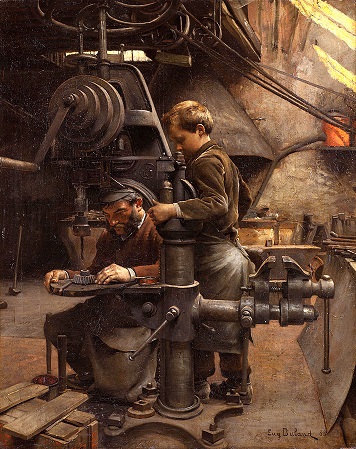
painting by Jean-Eugene Buland couretsy of wikipedia.org
Sitting down to lunch with my broker, his conversation turned to an old worry. “The national debt keeps growing. Congress has to reign it in.”
“What’s your solution?” I asked before taking a sip of coffee. “Should children of low-income families go without lunch? Should we put an end to healthcare for the indigent?”
My companion’s cheeks grew red. “I’m not proposing that. But if we don’t cut costs somewhere, we’ll all go down. Raising taxes harms the economy.”
“Let’s close tax loopholes, instead,” I replied. “Corporations and the superrich should pay their fair share.”
The man opposite me dropped his gaze to the menu as he uttered a sigh. “I think we should order.”
By now, our skirmishes over the economy had become a ritual, like an old Kabuki dance. Neither of us expected to convince the other. Still, over time, an idea formed in my head. I saw that neither of us had grappled with the essence of the problem: the way money flows in our society. Sorting ourselves into camps of right or left persuasion was pointless. The mess society finds itself in is the result of human enterprise.
Scientific or technological achievements both benefit and imperil us, whether they lie in harnessing atomic energy, extending human life, or advancing knowledge through artificial intelligence (AI). Yet each time we reach a crossroads for change, entrepreneurs gallop ahead, though they are no more far-sighted about the outcome than the average citizen. Even so, those of us who remain silent are responsible for the consequences. By enjoying the fruits of relentless industrialization, we have made climate change possible.
We have granted entrepreneurs another indulgence, one also detrimental to society: the right to accumulate vast sums of money. The result is economic inequality that endows the few with power over the many. Elan Musk, for example, imagines his entrepreneurship gives him the right to decide the outcome of warring armies. Hail Caesar!
Do these oligarchs of innovation set out to degrade our democracy? I doubt it. Generally, they are inspired by an idea they believe will benefit the public and themselves. If they are successful, money and influence follow. Call it the unwritten law of greed, but the more they gain, the more reluctant they are to share. They cannot help themselves. A plethora of studies show that unlimited access to money and power physically alters the brain and changes its thought processes. One historian likens the aberration to a tumor that destroys human sympathy.
Doug Rushkoff, a media theorist, describes the outcome of this affliction on society. …a whole bunch of billionaires [have] left a whole lot of really poor and unhappy people. (“The Defector” by Malcolm Harris, Wired, Sept. 23, 2023, pg. 28)
Entrepreneurship is a poor tool for defending a democracy. Its objective, according to economist Glen Weyl, isn’t to spread equality but to end competition. Should we be surprised when entrepreneurs prove unresponsive to the needs of others? Psychologist Timothy Leary didn’t think so. He once described them as psycho-sexually immature white men who want all the benefit[s] of being sealed up in their perfectly controlled and responsive environments without ever having to face the messy, harsh reality of the real world. (“The Defector,” by Malcomb Harris, Wired, Sept. 23, 2023, pg. 68)
Leary singles out white men for criticism but history provides no evidence that women and minorities, given the same privileges, would behave differently. Self-love is a condition of being human. Take the example of one newly minted entrepreneur. He avows the goal of his startup is to make technology safe for humanity. (“Transformers,” by Steven Levy, Wired, October 2023, pg. 37.) Even so, success has brought a change. No longer an open-source organization that shares its creativity, his company, having grown to almost $30 billion, has gone private. (Ibid, pg. 37.) It’s a progression all too familiar.
This sense of history brings me to the role the elderly should play in modern society. After retiring, many return to the workplace bringing with them a different perspective than their younger coworkers. Most importantly, they tend to humanize the environment, displaying more patience on the job than their younger colleagues. Says one manager, we find that retirees are really great at interacting with clients and showing empathy. (“How We Are Changing America,”pg. 7)
In their new role, the old blanch to learn that among the young are those who show an alarming willingness to question democracy’s value. The latter even dare to ask, “Would it be a bad thing to build a machine that CHANGES HUMAN LIFE AS WE KNOW IT, (“Future Tense,” by Nick Bilton, Wired, October 2023, pg. 77-81) Given what’s at stake, seniors may be forgiven for worrying about the future of their children and their children’s children. Experience has taught them that it’s easier to destroy a civilization than to build one.
Frankly, as someone old, I grow weary of complaints about Joe Biden’s age. The number of candles on a cake has nothing to do with leadership. What matters is vigor coupled with wisdom born from practice. These the President has.
What is aging, after all, but one of several altered states in a life? Is one period in time truer than the one before or after it? We can only know what we know at a given point in life. Someone young looks to the future and sees a road not taken. Someone old pauses, remembering where the minefields are.
No one either young or old, rich or poor, poet or scientist sees the whole of existence. It takes a village for us to prosper. Simply put, we need each other.
